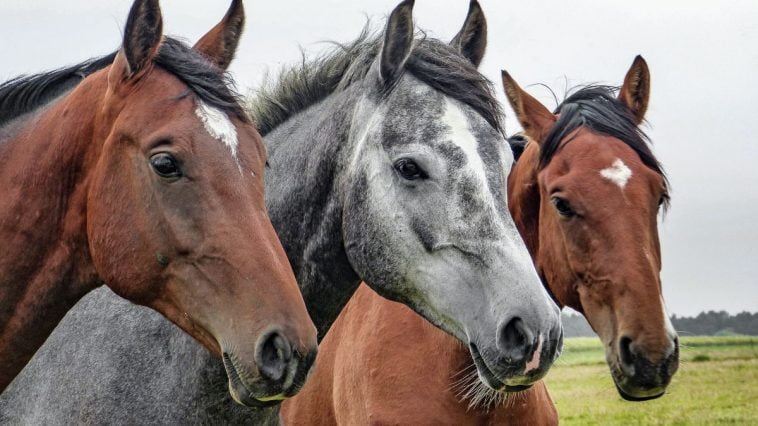Colic is a common condition in horses that can be very painful. There are several different types of colic, but the most common is abdominal pain. Colic can be caused by many different things, such as eating too much, drinking too much, or even just getting too excited. Treatment for colic usually involves giving the horse pain medication and waiting for the pain to go away. However, if the colic is severe, surgery may be necessary. Prevention of colic is important, and there are several things that can be done to help prevent it. These include feeding the horse a balanced diet, making sure they have plenty of water to drink, and avoiding sudden changes in their routine.

What is Equine Colic?
There are many different types of colic in horses, but all of them share a few common symptoms. These include restlessness, sweating, kicking at the belly, reluctance to move, and lying down and getting back up again frequently. Some horses may also roll on the ground or try to bite at their flanks.
The most common cause of colic is actually gastrointestinal pain, which can be caused by a variety of things. One of the most common is gas build-up in the intestines, which can be caused by everything from dietary changes to stress. Other potential causes include food allergies, parasites, ulcers, and blockages in the intestines.
Fortunately, most episodes of colic can be treated without resorting to surgery. The first step is usually to give the horse a pain reliever and something to help with gas (like simethicone). If that doesn’t work, your vet may try antispasmodics or even acupuncture. In more severe cases, surgery may be necessary to remove any blockages or correct any other underlying problems.
Preventing colic is often a matter of good management practices. This means feeding your horse a consistent diet (with gradual changes if necessary), making sure they have access to plenty of fresh water at all times, and keeping an eye out for early signs of stress (which can lead to gastrointestinal problems). Regular vet check-ups are also important in order to catch any potential problems early on.
Causes of Equine Colic
There are many potential causes of colic in horses, and the exact cause can often be difficult to determine. Some of the more common causes include:
-Ingestion of foreign objects or debris
-Eating too much or too little
-Changes in diet or environment
-Intestinal parasites
-Stressful events such as transport or competition
Colic can also be caused by a variety of medical conditions, including gastric ulcers, kidney disease, and liver disease. In some cases, the exact cause of colic may never be determined.
Symptoms of Equine Colic
There are a few different types of colic, each with their own set of symptoms. The most common symptom is abdominal pain. This can be anything from a mild discomfort to severe pain. Other symptoms include:
– pawing at the ground
– kicking at the belly
– looking back at the belly
– sweating
– elevated heart rate
– restless behaviour
If your horse is showing any of these symptoms, it’s important to contact a veterinarian right away. They will be able to determine if it is indeed colic and start treatment as soon as possible.

Treatment of Equine Colic
There are many different treatments for colic in horses, and the type of treatment will depend on the cause of the colic. For example, if the colic is caused by gas, the horse may be given a gas-relief medication. If the colic is caused by impaction, the horse may be given a laxative to help move the impacted material through its digestive system.
If the colic is more severe, or if the cause is unknown, more aggressive treatment may be necessary. The horse may need to be hospitalized so that it can be monitored and treated around-the-clock. Intravenous fluids may be given to prevent dehydration, and pain medication may be administered to keep the horse comfortable. In some cases, surgery may be necessary to remove blockages or correct other problems in the digestive system.
Prevention of colic is always preferable to treatment, and there are several things that owners can do to reduce their horses’ risk of developing this condition. For example, feeding a high-quality diet and maintaining good dental care can help reduce the risk of impaction colic. Avoiding sudden changes in diet or exercise routine can also help, as these can contribute to gas or spasmodic colic. Providing your horse with plenty of fresh water and making sure that its stall is clean and free of debris can also minimize the risk of developing colic.
Prevention of Equine Colic
There are many things that can be done to prevent equine colic, and it is important to be proactive in order to keep your horse healthy. Some of the primary prevention methods include:
-Providing adequate amounts of forage and hay, as horses are designed to eat small meals throughout the day.
-Making sure there is clean, fresh water available at all times.
-Avoiding sudden changes in diet or feeding schedule.
-Exercising regularly to maintain a healthy gut motility.
-Keeping stress levels low and providing a consistent routine.
If you are unsure about anything related to your horse’s diet or health, it is always best to consult with a veterinarian. They can help you create a tailored plan to prevent colic and keep your horse happy and healthy for years to come.
When to Call the Vet
When to Call the Vet
If you think your horse may have colic, call your veterinarian immediately. The sooner colic is diagnosed and treated, the better the chances for a full recovery. If you cannot reach your veterinarian, or if the situation is life-threatening, call an equine hospital or emergency clinic.
Conclusion
In conclusion, colic in horses is a very serious condition that can have many different causes. If you suspect your horse may be colicking, it is important to seek veterinary attention immediately. There are many different treatment options available for colic, so working with your vet to find the best option for your horse is essential. With proper prevention and care, horses can enjoy a long and healthy life free from colic.


